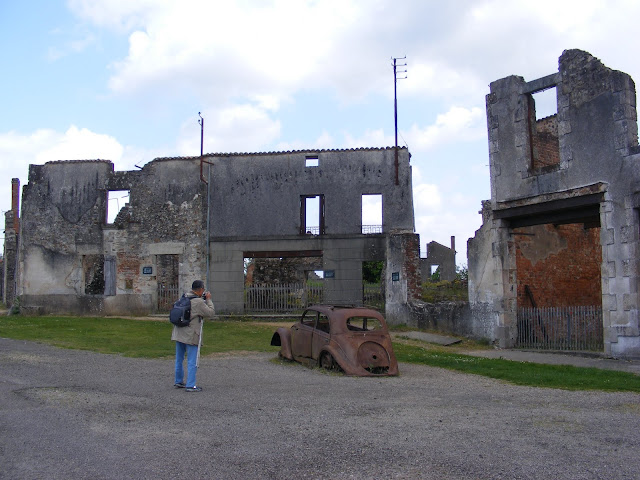I took a lot of photos and wept a bit as we walked round. What was somehow more dispiritng was the discovery that some of the SS troops were in fact French, conscripted from Alsace-Lorraine. Anyway, here are a few of the photos.
The trams used to run between Oradour and Limoges. Oradour was a favourite picnic spot for the city dwellers.
The car (a Renault I think) has been there since 1944, as the Germans left it.
Below - a few of the names on the village memorial. Note the ages.
I don't know if you're familiar with the idea of the "inner discourse", but there's an article on Wikipedia which gives this as an example of the process: An inner discourse takes place much as would a discussion with a second person. One might think, "I need $27 for the paper boy. I have some paper currency in my wallet. Ten plus ten plus five... I have $25. Damn. Maybe I dropped coins in the sofa. Ah, here they are..." The ideal form of inner discourse would seem to be one that starts with statements about matters of fact and proceeds with logical rigor until a solution is achieved.
What (I kept wondering as we walked round Oradour) was the inner discourse of the killers? What did they tell themselves they were doing as they machine gunned terrified, unarmed men and boys? As they walked over the dead and dying to administer the coup de grace with a luger to those who were still twitching or crying out? What did they tell themselves they were doing as they herded all the women and children - yes, down to infants of one month - into the town church and set fire to it with incendiary devices? As they machine gunned those women and children who tried to escape the conflagration? As they piled up the bodies to burn them, or dug pits hastily for mass burials?
They knew what they were doing - they lied about it immediately afterwards in official documents, and later at the few trials which dribbled on into the 1980s. None of them stayed in prison very long; the French SS were pardoned because they said they were acting under duress.
This was shock and awe on a local scale. How have Bush and Blair escaped prosecution for their city-wide shock and awe in Iraq?





2 comments:
Your comments and thoughts about "the inner discourse" are a wonderful commentary on how decent people look back at the atrocities of that war, and yes, 'incidents' in more recent wars will hopefully be looked upon in the same light.
The wars might be justified, atrocities never.
Dave ( Mudplugga )
It is truly heartbreaking to learn about this horrific event.
Post a Comment